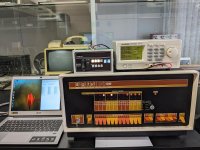Making some progress, but a bit slower than I'd like due to time available to work on this. There's at least one unit that appears to be fully functional. It passes the tester's "Write Loop Random" test, so it reads and writes pseudorandom cylinder/head/sectors with pseudorandom data. I've run it several times overnight which reads/writes about 500,000 sectors each time. The Seek Loop test responses are correct for valid and invalid cylinder addresses. Drive Address selection for all four addresses in RK8-E mode function correctly. File Ready, RWS Ready, write protect and write protect status appear to function properly.
The OLED display works now. I switched to a different SSD1306 display library that doesn't conflict with the UART.
Lower priority things to work on:
The DC Low output has not been tested or adjusted.
microSD card reading and writing is slower than I'd like, takes about 30 seconds to load and unload. Should probably save binary data rather than hex data on the card, and also speed up the SPI link.
Verify other modes besides RK8-E mode.
two of the 5 boards build appear to be working fine:
#1 - has three damaged FPGA pads. Tried to repair it but it's quite difficult.
#2 - working fine as an RK05 emulator and has been extensively debugged and tested.
#3 - working fine as an RK05 tester
#4 - as an emulator fails the "Write Loop Random" test
#5 - as an emulator fails the "Write Loop Random" test
Currently adding capability to automatically verify interface signals, DRAM, front panel LEDs and switches. This is to verify "is it built correctly?" rather than "is it designed correctly?".


